Let's Talk about the present and future of Artificial Intelligence 🤖 [SPA][ENG]
¡Hola a todos y bienvenidos a este nuevo post! 😁 El día de hoy quiero compartir con ustedes algunas de mis reflexiones sobre la inteligencia artificial, sus implicaciones actuales y futuras. En lo personal, es un tema que me fascina mucho y que traerá grandes beneficios para la humanidad. Sin embargo, hay varias cosas por solucionar especialmente en la ética y el bienestar de las personas.
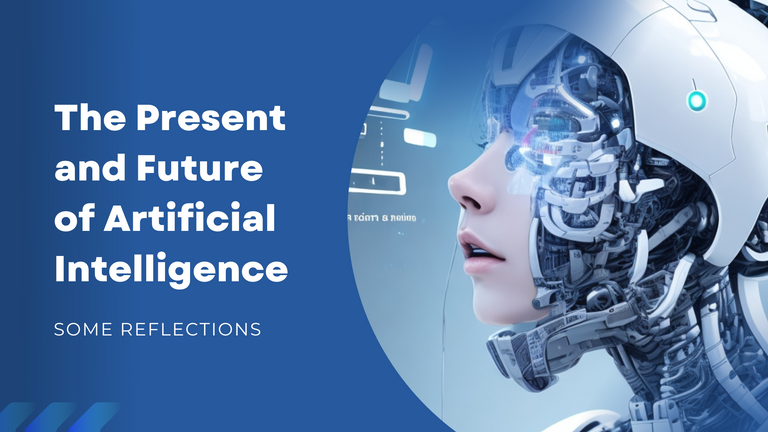
La inteligencia artificial se encuentra en la mayoría de los servicios que utilizamos, las películas que nos recomiendan, los productos que nos ofertan y las noticias que llegan a nuestro móvil, es decir, vemos un mundo creado especialmente para nosotros. Sin embargo, esto provoca una percepción diferente de la realidad y, con el surgimiento de las inteligencias artificiales que generan imágenes, clonan voces, crean videos o música, puede significar el fin de la realidad como la conocemos.
En este orden de ideas, la inteligencia artificial está revolucionando los trabajos creativos, pues, con el surgimiento de herramientas como ChatGPT y DALL-E 2 las personas pueden generar cualquier cantidad de textos realistas, así como imágenes profesionales y utilizarlas en sus proyectos personales o de carácter comercial. Esto es beneficioso para las empresas y los emprendedores, ya que reduce los costos, pero también tiene algunas desventajas como la pérdida de empleos, los cuales pueden ser sustituidos por una herramienta de inteligencia artificial.
En este sentido, es una tecnología que ha pasado de los laboratorios a las manos de cualquier persona a través de una computadora o un teléfono. Gracias a empresas como OpenAI y la comunidad de código abierto, se está haciendo más accesible el uso de la inteligencia artificial. No obstante, esto tiene tanto beneficios como riesgos, así que hay que detenerse un momento para pensar cómo será el futuro de nuestra sociedad.
El ser humano pensó que la creatividad era una de las cualidades que lo distinguían de los demás seres vivos y lo hacían único. Sin embargo, se ha podido observar que esta habilidad también puede ser imitada por las máquinas, obteniendo un desempeño igual o superior al de los seres humanos. En este sentido, ha aumentado el número de empleos que pueden ser sustituidos por una inteligencia artificial. Algunas personas creen que una inteligencia artificial les quitará su trabajo, mientras que otras opinan que les facilitará su trabajo.
Dicho esto, se está presentando un fenómeno similar al de la Revolución Industrial, en donde desaparecieron empleos, por ejemplo, las tejedoras manuales fueron reemplazadas por el telar mecánico y los operadores de fábricas fueron reemplazados por brazos robóticos. No obstante, como toda revolución tecnológica, también surgirán nuevos empleos en donde las personas empezarán a especializarse, uno de ellos es el “Prompt Engineer”, es decir, aquellas personas que saben dar instrucciones precisas a la máquina para obtener los resultados esperados. Sin embargo, estos nuevos empleos requieren de un mayor nivel de especialización y tienen una mayor curva de aprendizaje. Esto genera dificultades para poder encontrar un empleo, lo cual se traduce en pobreza y contribuye al aumento las desigualdades.
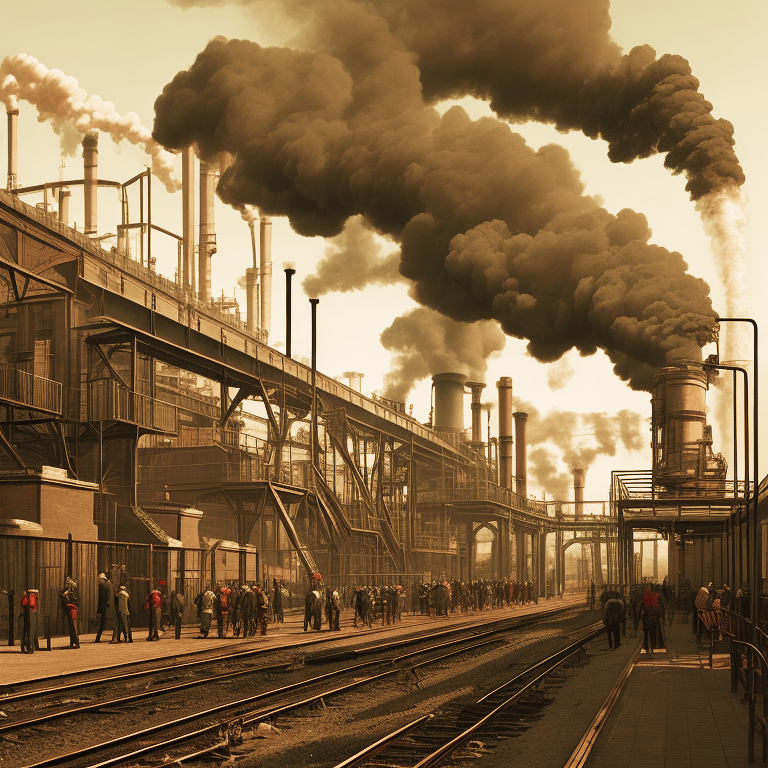
Prompt: the industrial revolution, steam machines, train, a lot of workers, smoke, machines, coal
Otro aspecto a tener en mente es que los modelos más grandes de inteligencia artificial están siendo creados por las grandes empresas, como OpenAI, Google, Microsoft, Meta, entre otros, porque son aquellos que tienen los mayores recursos computacionales. Sin embargo, se está creando una dependencia de estas grandes empresas, de sus costos y restricciones. Además de esto, se deja de contratar los servicios de un artista o especialista, para acudir a estos servicios de inteligencia artificial y realizarlo de forma autónoma a un costo inferior.
Por otra parte, una cuestión ética y legal es la autoría, ya que las computadoras aprenden de los datos disponibles en Internet y, aunque estos modelos no copian o plagian el contenido existente, pueden aprender los patrones y estilos presentes en esas obras de arte elaboradas por un autor humano, el cual puede no haber dado su consentimiento. De igual forma ocurre con las figuras públicas, porque cualquier persona puede generar imágenes falsas con su rostro, las cuales pueden ser ofensivas, inadecuadas y visibles para todos, sin proveer su consentimiento. No obstante, es totalmente legar utilizarlas, inteligencias aritificales como Stable Diffusion o Leonardo.AI te ofrece los derechos o la autoría del contenido que geners, Midjourney solo las puedes usar comercialmente si pagas una suscripción, en cambio, Adobe Firefly o Bing Image Generator si poseen derechos de autor y nunca deben usarse comercialmente
Otro gran riesgo de la inteligencia artificial y las imágenes generativas es el de la desinformación, pues ahora es mucho más sencillo crear imágenes falsas o engañosas, las cuales pueden ser difundidas en portales web e impactar a un gran número de personas. También surgirán nuevos mecanismos de estafas, manipulación de masas y su uso inadecuado puede cobrar la vida de muchas personas. Aunado a esto, pueden crearse noticias personalizadas basadas en tu perfil y en tus sesgos, haciéndote creer en una realidad que no existe.
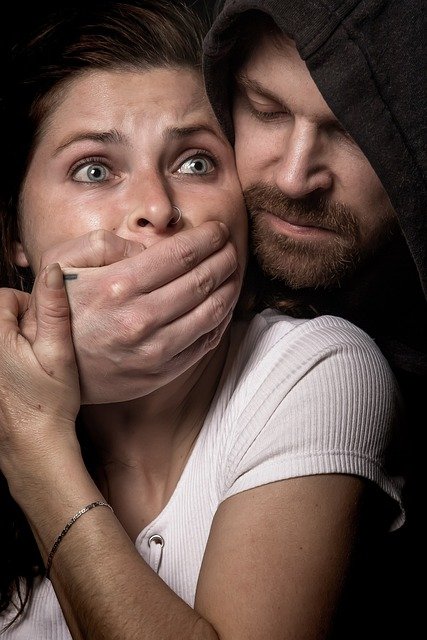
Dicho esto, las personas no podrán distinguir cuándo las fotos o los videos son reales o falsos, lo que podría generar mucha confusión y dificultar la aplicación de la justicia en casos de delitos. Esto podría causar que más crímenes queden sin resolver y se mirará con escepticismo todo lo que se ve o se escucha. Esto sería especialmente un problema en casos de robo de identidad, secuestros y violaciones, donde es más probable que ocurran acusaciones falsas y las alegaciones de que las pruebas fueron generadas por inteligencia artificial pueden dejar libres a los culpables. La pregunta es, ¿en qué tipo de evidencia se confiará realmente frente a un delito, si las fotografías y los audios pueden ser generados por computadora?
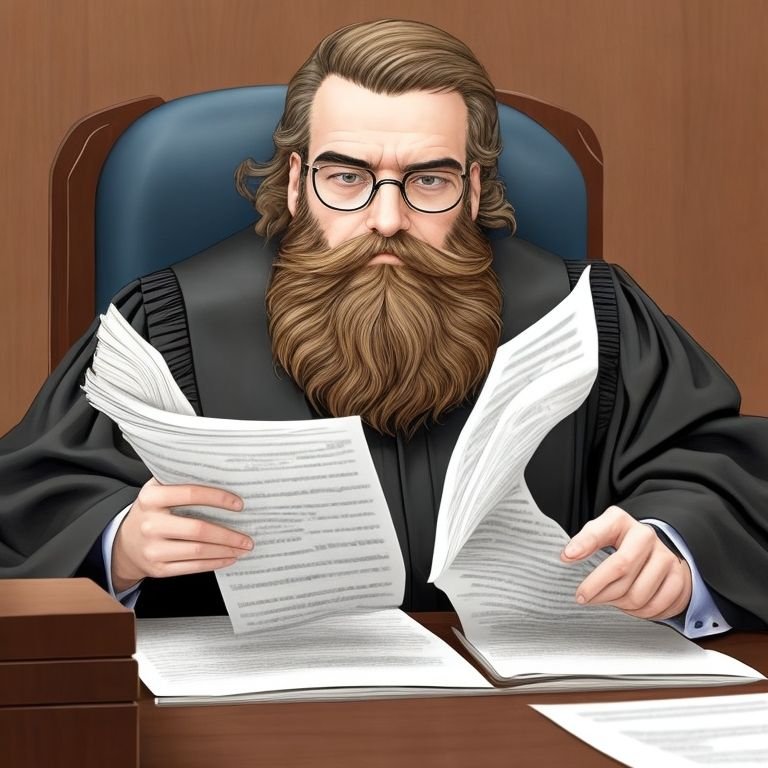
judge reading papers in court, seeing the evidence, sitting in the court, beard, glasses, facing down
La información falsa puede ocasionar altercados e iniciar guerras, por eso se dice que puede ser colapso de la realidad. En este sentido, si se desea un mundo mejor y no acabar con la destrucción de la humanidad, hay que tomar medidas el día de hoy. En primer lugar, se necesita la creación de estándares y certificaciones criptográficas para distinguir aquel contenido real, de aquellos generados artificialmente. Asimismo, se necesitan reuniones internacionales y establecer límites para evitar el uso tóxico de esta tecnología. Por último, se requiere crear programas de divulgación y educar a las personas desde jóvenes para no dejarse convencer por los bulos audiovisuales, verificar la fuente, buscar evidencias y confirmar los hechos.
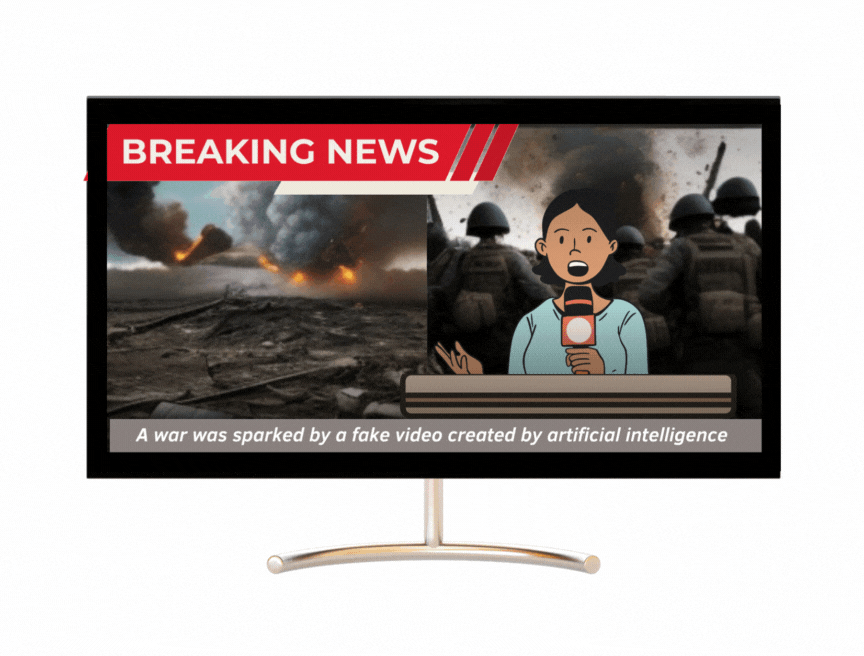
En conclusión, la inteligencia artificial no es el fin de los profesionales, ni del arte, porque el arte, además de ser un producto, le permite al ser humano expresar sus sentimientos, ideas y transmitir un mensaje. No obstante, esta tecnología se convertirá en un elemento importante en nuestras vidas. Es una herramienta más que se debe aprender a utilizar para poder potenciar nuestras capacidades y, solo aquellos profesionales que aprendan a utilizarlas para optimizar sus tareas y mejorar su productividad son los que obtendrán una ventaja competitiva en el campo laboral.
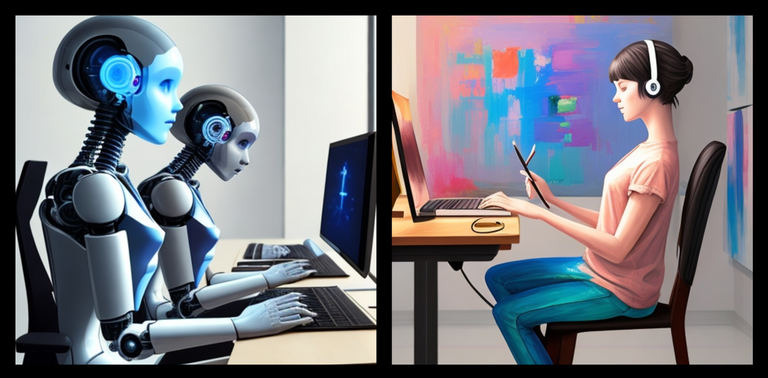
Prompt: human competing with an artificial intelligence, both are sitting in front of their own computer, side by side, detailed, robot and human
B: ai virtual assistant artist helper sitting on a chair, painting
Algunas empresas ya han tomado conciencia de la ética de la inteligencia artificial y han trabajado con cautela, sin embargo, en un mundo donde existe una alta competitividad, responder apresuradamente para salir al mercado trae como consecuencia modelos o tecnologías que no han sido totalmente probadas, las cuales originan riesgos para la sociedad, pero el gran peligro es ignorar estas señales de alarma con la intención de no quedarse atrás. Por esta razón, es importante detenerse a pensar cuáles son las implicaciones de la inteligencia artificial, así como su impacto.
Hay que ser muy cuidadosos, conscientes y no dejarse vislumbrar por los beneficios que trae una nueva tecnología sin pensar en los riesgos, pues conociendo el potencial que tienen estas tecnologías, no falta la persona que desea utilizarla para el mal.
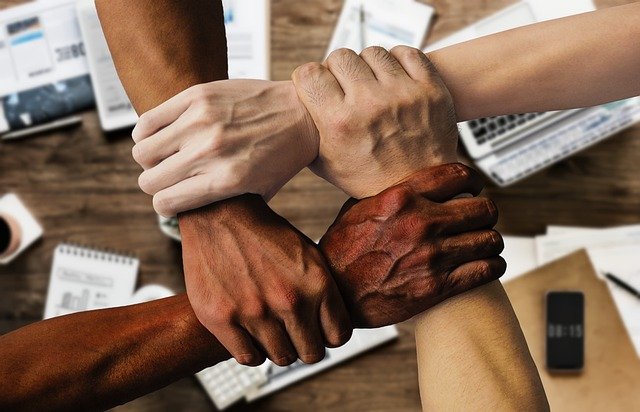
¡Gracias por leerme! Espero que les haya gustado esta publicación. ¿Tú que opinas sobre la inteligencia artificial?. Déjamelo saber en los comentarios.
¡Saludos y espero verlos pronto! 🤗
English Version
Hi everyone and welcome to this new post! 😁 Today I want to share with you some of my thoughts about artificial intelligence, and its current and future implications. Personally, it is a topic that fascinates me a lot and that will bring great benefits to humanity. However, there are several things to be solved especially in ethics and people's welfare.

Artificial intelligence is found in most of the services we use, the movies that are recommended to us, the products that are offered to us and the news that reach our mobile, that is, we see a world created especially for us. However, this causes a different perception of reality and, with the emergence of artificial intelligences that generate images, clone voices, and create videos or music, it could mean the end of reality as we know it.
In this order of ideas, artificial intelligence is revolutionizing creative works, since, with the emergence of tools such as ChatGPT and DALL-E 2, people can generate any amount of realistic texts, as well as professional images, and use them in their personal or commercial projects. This is beneficial for companies and entrepreneurs, as it reduces costs, but it also has some disadvantages such as the loss of jobs, which can be replaced by an artificial intelligence tool.
In this sense, it is a technology that has moved from the laboratories to the hands of any person through a computer or a phone. Thanks to companies like OpenAI and the open-source community, the use of artificial intelligence is becoming more accessible. However, this has both benefits and risks, so we need to pause for a moment to think about what the future of our society will look like.
Human beings thought that creativity was one of the qualities that distinguished them from other living beings and made them unique. However, it has been observed that this ability can also be imitated by machines, obtaining a performance equal to or superior to that of human beings. In this sense, the number of jobs that can be replaced by artificial intelligence has increased. Some people believe that artificial intelligence will take away their job, while others believe that it will make their job easier.
That said, a phenomenon similar to that of the Industrial Revolution is taking place, where jobs disappeared, for example, hand weavers were replaced by the mechanical loom and factory operators were replaced by robotic arms. However, like any technological revolution, new jobs will also arise where people will start to specialize, one of them is the "Prompt Engineer", i.e., those people who know how to give precise instructions to the machine to obtain the expected results. However, these new jobs require a higher level of specialization and have a higher learning curve. This generates difficulties in finding a job, which translates into poverty and contributes to increasing inequalities.

Prompt: the industrial revolution, steam machines, train, a lot of workers, smoke, machines, coal
Another aspect to keep in mind is that the largest artificial intelligence models are being created by large companies, such as OpenAI, Google, Microsoft, Meta, among others, because they have the largest computational resources. However, a dependence on these large companies, their costs and restrictions is being created. In addition to this, the services of an artist or specialist are no longer contracted, in order to resort to these artificial intelligence services and perform them autonomously at a lower cost.
On the other hand, an ethical and legal issue is authorship, since computers learn from the data available on the Internet and, although these models do not copy or plagiarize existing content, they can learn the patterns and styles present in those works of art produced by a human author, who may not have given his consent. The same happens with public figures, because anyone can generate fake images with their face, which can be offensive, inappropriate and visible to everyone, without providing their consent.
Another great risk of artificial intelligence and generative images is that of disinformation since it is now much easier to create false or misleading images, which can be disseminated on web portals and impact a large number of people. New mechanisms for scams and manipulation of the masses will also emerge, and their improper use can claim the lives of many people. In addition, personalized news can be created based on your profile and biases, making you believe in a reality that does not exist.

The people will not be able to distinguish when photos or videos are real or fake, which could lead to a lot of confusion and make it difficult to enforce justice in criminal cases. This could cause more crimes to go unsolved and everything seen or heard will be looked at with skepticism. This would especially be a problem in cases of identity theft, kidnapping and rape, where false accusations are more likely to occur and allegations that evidence was generated by artificial intelligence may let the guilty go free. The question is, what kind of evidence will really be trusted in the face of crime, if photographs and audio can be computer generated?

False information can cause altercations and start wars, that is why it is said that it can be a collapse of reality. In this sense, if we want a better world and not end up with the destruction of humanity, we must take action today. In the first place, the creation of cryptographic standards and certifications is needed to distinguish real content from artificially generated content. Also, international meetings are needed and limits must be established to avoid the toxic use of this technology. Finally, it is necessary to create outreach programs and educate people from a young age not to be convinced by audiovisual hoaxes, verify the source, look for evidence and confirm the facts.

In conclusion, artificial intelligence is not the end of professionals, nor of art, because art, besides being a product, allows human beings to express their feelings, and ideas and convey a message. However, this technology will become an important element in our lives. It is one more tool that we must learn to use in order to enhance our capabilities, and only those professionals who learn to use it to optimize their tasks and improve their productivity will gain a competitive advantage in the workplace.

Prompt: human competing with an artificial intelligence, both are sitting in front of their own computer, side by side, detailed, robot and human
B: ai virtual assistant artist helper sitting on a chair, painting
Some companies have already become aware of the ethics of artificial intelligence and have worked with caution, however, in a world where there is high competitiveness, responding in haste to go to market brings as a consequence models or technologies that have not been fully tested, which originate risks for society, but the great danger is to ignore these warning signs with the intention of not being left behind. For this reason, it is important to stop and think about the implications of artificial intelligence, as well as its impact.
We must be very careful, and aware and not let ourselves be glimpsed by the benefits that new technology brings without thinking about the risks, because knowing the potential that these technologies have, there is no lack of people who want to use it for evil.

Thanks for reading! I hope you liked this post, what do you think about artificial intelligence?. Let me know in the comments.
Bye and I hope to see you soon! 🤗
Sigue, contacta y apóyanos en:
¡Muchas gracias! 🤗